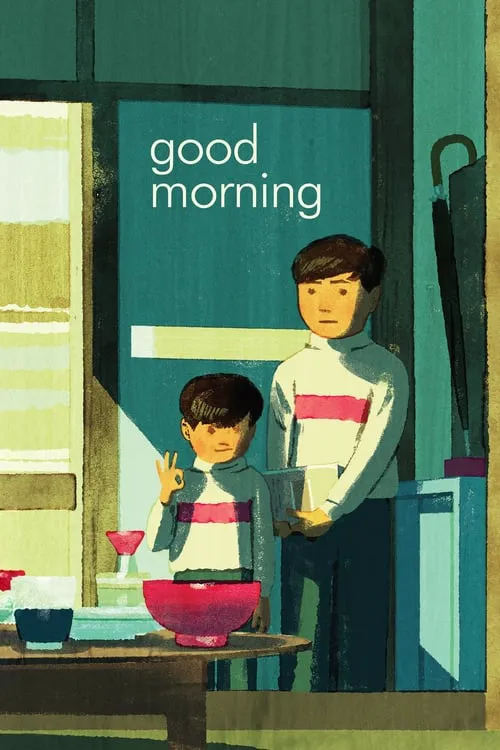Good Morning

Plot
In the tranquil suburban setting of Tokyo, Japan, following the devastation of World War II, director Yasujiro Ozu brings to life a heartwarming and insightful comedy of manners in "Good Morning." The film masterfully captures the intricacies of family dynamics and social dynamics through the eyes of two spirited young boys who rebel against their parents' authority in protest against their unyielding resolve to resist the allure of modern consumerism. The story revolves around two siblings, Toshio and Koji, who are both in elementary school but have distinct personalities. Toshio is a responsible and obedient young boy who tries his best to follow his parents' instructions. On the other hand, Koji is a free-spirited and mischievous young boy who loves to test the boundaries and provoke reactions from those around him. Their contrasting approaches to life often put them at odds, but despite their disagreements, they share an unbreakable bond. One day, their parents, Hisaji and Shige, are approached by their neighbors about installing a television set in their house. The neighbors have already acquired one, and it seems as though every household in the neighborhood is getting one. However, Hisaji and Shige refuse to budge, citing that they cannot afford it, and that it's an unnecessary luxury that will distract them from the importance of family and community. The neighbors and other adults in the community are puzzled by their decision, but the two boys see this as a personal affront to their desire to experience the world beyond their own. Toshio, who is more inclined to follow rules, initially tries to persuade his father to change his decision. He rationalizes that having a television set would be beneficial for the family and their social interactions. However, when this doesn't work, Koji takes it upon himself to rebel against their parents' decision by refusing to speak to anyone, including his own parents. Inspired by Koji's bold stance, Toshio begins to follow suit, and they both decide to stop speaking as a form of protest against the perceived adult oppression. As the days go by, the community around them becomes increasingly aware of the silent protest. Neighborhood gossip spreads about the boys' actions, and curiosity grows about their motives. The parents, particularly Hisaji, try to reason with the boys, but Koji refuses to budge, insisting that the adults just don't understand them. Hisaji, trying to teach his sons the value of perseverance, continues to resist the temptation of buying a television set. However, the community's fascination with their unusual behavior slowly begins to unravel, revealing the absurdity and fragility of the adult world. Ozu masterfully captures the foibles of the adult community, who become increasingly obsessed with material possessions, from televisions to washing machines. As the boys' silence continues to disrupt the equilibrium of their community, Ozu satirically highlights the pitfalls of consumerism, which had begun to permeate post-war Japan. On a deeper level, the story explores the nuances of intergenerational relationships. The parents, despite their attempts to be strict, are revealed to be kind-hearted and loving. Shige's gentle nature and the boys' affection for her are evident throughout the film. Hisaji's decision to resist the television set, though stubborn, stems from a desire to preserve a sense of community and family bonding that he believes is being disrupted by the increasingly commercialized society. As the story unfolds, tensions within the family subside as they collectively face the consequences of their actions. Koji slowly begins to open up to his parents, and Toshio starts to question the value of their sacrifice. The boys learn the importance of family, community, and communication, as they come to understand that their decision to stop speaking was, in part, a manifestation of their desire for connection and belonging. In "Good Morning," Yasujiro Ozu masterfully crafts a poignant and uplifting tale of growing up, identity, and social commentary. The film's gentle satirical gaze on consumerism in post-war Japan is infused with a deep respect for the human experience and the complexities of family dynamics. By using the innocent eyes of two young boys, Ozu reminds us that the world is full of imperfections and contradictions, but it is in embracing those complexities that we find the greatest value in life.
Reviews
Recommendations




